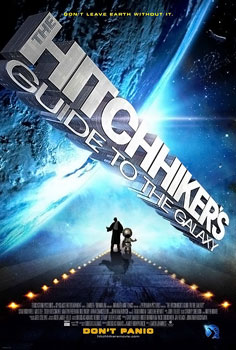
Science fiction first appeared in television programming in the late 1930s, during what is called the Golden Age of Science Fiction. Special effects and other production techniques allow creators to present a living visual image of an imaginary world not limited by the constraints of reality.

The Hitchhiker's Guide to the Galaxy is a comedy science fiction franchise created by Douglas Adams. Originally a 1978 radio comedy broadcast on BBC Radio 4, it was later adapted to other formats, including novels, stage shows, comic books, a 1981 TV series, a 1984 text adventure game, and 2005 feature film.

The Amazing 3, or Wonder 3, is a Japanese comic series and a black-and-white Japanese animated television series created by Osamu Tezuka in the 1960s. It involves the adventures of three agents from outer space who are sent to Earth to determine whether the planet, a potential threat to the universe, should be destroyed. Landing on Earth, the characters take the form of a rabbit, a horse, and a duck, and make friends with a young human boy.
Galaxy High School (ギャラクシー・ハイスクール) is a science fiction animated series that premiered on September 13, 1986, on CBS and ran for 13 episodes until December 6, 1986. The series was created by Chris Columbus and featured music and a theme song composed by Don Felder.

Carson Wayne Newton, also known as Mr. Las Vegas, is an American singer and actor. One of the most popular singers in the United States from the mid-to-late 20th century, Newton remains one of the best-known entertainers in Las Vegas and has performed there since 1963. He is known by other nicknames such as "The Midnight Idol" and "Mr. Entertainment".

Mephisto is a fictional character appearing in American comic books published by Marvel Comics. The character first appeared in Silver Surfer #3, and was created by Stan Lee and John Buscema and based on Mephistopheles: a demon character from the Faust legend, who has sometimes been referred to as Mephisto. Introduced as a recurring adversary of the Silver Surfer and Ghost Rider, Mephisto has also endured as one of Spider-Man's most prominent adversaries, being responsible for Norman and Harry Osborn's respective transformations into the Green Goblin and Kindred; and for the superhero's loss of his marriage to Mary Jane Watson, considering their future daughter Spider-Girl his archenemy. Mephisto has often come into conflict with Doctor Strange, Doctor Doom, Scarlet Witch and other heroes of the Marvel Universe, being responsible both for the creation of the Cosmic Ghost Rider and the descents of Phil Coulson and Otto Octavius into villainy.

The Hitchhiker's Guide to the Galaxy is a 2005 science fiction comedy film directed by Garth Jennings, based upon the Hitchhiker's Guide to the Galaxy series created by Douglas Adams. It stars Martin Freeman, Sam Rockwell, Mos Def, Zooey Deschanel, Bill Nighy, Anna Chancellor, and John Malkovich, and the voices of Stephen Fry, Helen Mirren, Richard Griffiths, Thomas Lennon, Ian McNeice, and Alan Rickman. Adams co-wrote the screenplay with Karey Kirkpatrick but Adams died in 2001, before production began, therefore the film is dedicated to him. The film received mainly positive reviews and grossed over $100 million worldwide.
The Hitchhiker's Guide to the Galaxy is a comic science fiction series created by Douglas Adams that has become popular among fans of the genre and members of the scientific community. Phrases from it are widely recognised and often used in reference to, but outside the context of, the source material. Many writers on popular science, such as Fred Alan Wolf, Paul Davies, and Michio Kaku, have used quotations in their books to illustrate facts about cosmology or philosophy.
Phoenix Five is an Australian science fiction television series which first screened on the ABC in 1970. It was later also screened on the Seven Network. It was part of a trilogy and followed on from the six part serial The Interpretaris in 1966 and seven part serial Vega 4 in 1968. However, it had 26 standalone episodes produced to make it viable as a syndicated series. Each of the series had different crews and casts but took place in the same future and used the same space organisation and miniatures, much as Star Trek did in the '80s and '90s, thus making it the first TV sci-fi franchise.

Galaxy was a short-lived British satellite television channel, owned and operated by British Satellite Broadcasting.

Six God Combination God Mars, commonly known in English as God Mars, is a 1980s mecha anime television series that was popular during its broadcast between 1981 and 1982 in Japan, Hong Kong and Italy. The series consists of 64 episodes and 2 special presentations. Other loosely translated names are "Hexademon Symbiote God Mars", "Six God Union God Mars", and "Six Gods United As One Being".
Science fiction television has been produced in Australia since the 1960s, as a homegrown response to imported overseas US and British shows.

The Marvel Cinematic Universe (MCU) is an American media franchise and shared universe centered on a series of superhero films produced by Marvel Studios. The films are based on characters that appear in American comic books published by Marvel Comics. The franchise also includes several television series, short films, digital series, and literature. The shared universe, much like the original Marvel Universe in comic books, was established by crossing over common plot elements, settings, cast, and characters.

The Samsung Galaxy Note is a discontinued line of high-end flagship Android phablets and smartphones developed and marketed by Samsung Electronics. The line was primarily oriented towards pen computing; all Galaxy Note models shipped with a stylus pen, called the S Pen, and incorporate a pressure-sensitive Wacom digitizer. All Galaxy Note models also include software features that are oriented towards the stylus and the devices' large screens, such as note-taking, digital scrapbooking apps, tooltips, and split-screen multitasking. The line served as Samsung's flagship smartphone model, positioned above the Galaxy S series, and was part of the wider Samsung Galaxy series of Android computing devices.
Leverne Ann McDonnell was an Australian actress.
The Western Conference is one of two conferences in USL Championship soccer.
The Interpretaris is an Australian children's science fiction television series which first screened on the ABC Television in 1966. It was later also screened on the Seven Network. It was part of a trilogy with spin-offs Vega 4 in 1968 and Phoenix Five in 1970. The show is named for a spaceship with a multinational crew tasked with finding the home systems of captured alien life forms.
The 2020 Las Vegas Lights FC season was the club's third season, and their third season in the United Soccer League Championship (USLC), the second division of American soccer. This article covers the period from November 18, 2019, the day after the 2019 USLC Playoff Final, to the conclusion of the 2020 USLC Playoff Final, scheduled for November 12–16, 2020.









